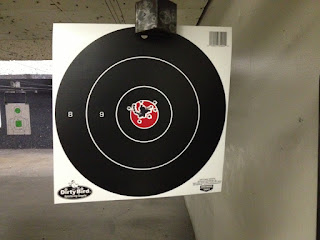Q: Do you have hobbies outside of your writing life? Tell about them. Do they feed your writing life? Do they get your mind off your current projects and their attendant frustrations? Do they satisfy a different part of you than is satisfied by your writing?
I used to have hobbies, I tell myself. But I’m not sure that’s true. There are things I do that seem hobby-like but they are almost always extensions of my writing life. For example, learning to shoot various firearms, led me into target shooting, which led me into skeet shooting. As odd as this sounds, target practice brings me a meditative peace.
Motorcycle riding had a similar calming effect. Both activities required me to split my mind. The logical part is fully engaged in safety concerns, but if I “think about” all the formulas involved in hitting a three inch flying clay disc, I am unable to do it. Instead, I intuit when to fire the shotgun. Riding on a race track is the same, to gain even slight mastery you need to both never forget the safety rules and not think about them at all.
Sadly politics and the people I started to run into at shooting ranges left me more agitated than tranquil. Several horrific accidents convinced me motorcycles were not a real option if I also wanted to be able to walk.
Exploring locations is another way to calm my brain, ease my worry and solve writing problems. “I’m going out looking for a place to torture McGuire,” I remember telling Erika. “Have fun,” she said, not looking up from her work. I walk my novels. Traveling, alone on a new road, the logical side of my mind is busy with maps and road rules while the creative side is allowed to wander.
These things have in common learning or discovering something new. This also tracks with how I write. One very personal thing I need to find when writing a new novel is, what am I learning as a writer on this one, what new technique am I gaining for the tool box? It can be as simple as first person vs third person point of view. Or combining the two. I need to both be discovering the story as I write it, and give my craft side something to work on.
Julia Cameron’s “The Artist's Way,” suggested an artist date, a time you take yourself places to fill up the well. I worked as a film editor at a shop a few blocks from the LA County Museum of Art. When I would get stuck on a cut, I’d go look at art. A lunch break spent looking at a huge canvas covered in lily pads really freed my mind.
A misremembered quote has stuck with me for years, “talking about art is like dancing to (about) architecture.” Dancing to architecture makes as much sense to me, as solving a film editing problem by staring at an oil painting. It is illogical yet it works. What we do in creating anything, takes logical and illogical thinking. It is the intellectual equivalent of rubbing our tummies while scratching our heads.
In the last few years my drive to produce more writing has collided with my responsibilities of being squished like the tuna and mayo in the generational sandwich. My work ethic drives me worse than any boss I ever had, demanding that I justify my time, my word count, my time management…
I clearly needed this question asked at this moment. So far I have described what hobbies do for me, and how I convince the taskmaster upstairs that they are work. While cleverly avoiding the question.
At this moment I don’t have any hobbies. I don’t have any time to let my mind wander/wonder. I have become the worst kind of boss/manager.
My well isn’t dry, but I am starting to pull up as much sand as water.
I’m struggling to find an upbeat end to this essay/post…
Failing that, here's picture of me painting when creation was a simple act of joy.
*****************
I’m talking about neurodiversity, writing Tricky, being a dyslexic film editor and more with Theo Smith at Neurodiversity - Eliminating Kryptonite & Enabling Superheroes Podcast.
https://anchor.fm/neurodiversity










